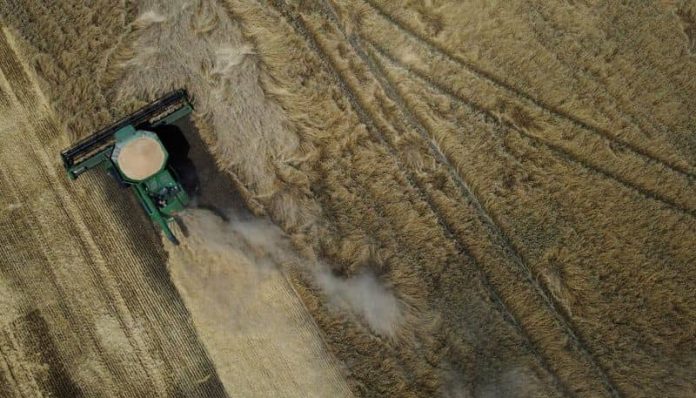By Pavel Polityuk
KYIV (Reuters) – Ukrainian farmers are not expected to reduce the area of winter wheat they sow for the 2024 harvest despite higher logistics costs due to the wartime export crisis, a senior farming official told Reuters on Tuesday.
Ukraine is a major wheat producer and the demise of the Black Sea (NYSE:SE) corridor used to safely export grain during the war spurred speculation that farmers could sow less wheat because of shrinking profit margins due to costlier export routes.
On Monday, the agriculture ministry quoted survey data as showing that farmers could indeed cut the area of winter wheat sowing, while increasing the area of winter rape for 2024 to a record high level.
However, First Deputy Agriculture Minister Taras Vysotskiy told Reuters on Tuesday that the possible reduction of winter wheat may total only 0.1%.
“Wheat not significantly – minus 0.1%” he said. The estimate has not previously been reported.
An expected reduction in the overall winter grain sowing area would come at the expense of other grains, he said, forecasting a drop of 5.4% in barley sowing this winter.
Ukraine sowed about 4.1 million hectares of winter wheat for the 2023 harvest, while the area under winter barley stood at around 615,000 hectares.
Ukraine is a traditional grower of winter wheat, which accounts for at least 95% of the country’s overall wheat output.
Farmers have already completed the 2023 wheat harvest, threshing 21.94 million metric tons. The harvest totalled 20.7 million tons in 2022.
The ministry has given no forecast for the total 2024 sowing area, but said the overall winter crop sowing area could rise by 0.5 million hectares, or 8%, compared to the previous season.
Traders say an increase in the sowing area of winter crops, especially in winter oilseeds, could mean that farmers sow less spring grain crops, with corn and spring barley most likely to suffer.
Ukraine can currently export limited volumes through small river ports on the Danube and via its western land border with the European Union.
That forced local producers to adjust their sowing plans in 2023 and switched from grain crops to oilseeds, which are more expensive but produce less volume.
Ukraine already reduced its sowing area for corn in favour of sunflowers in 2023.



















